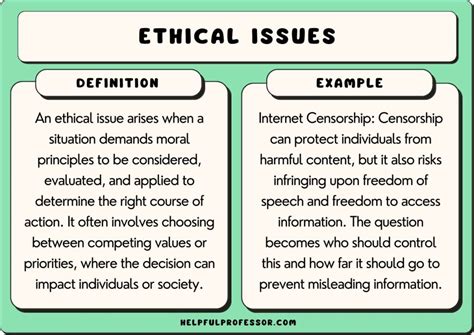Understanding Ethical Issues: A Concise Definition and Overview

Understanding Ethical Issues: A Concise Definition and Overview
Ethical issues are at the heart of decision-making in both personal and professional contexts. They involve moral principles that guide behavior, ensuring fairness, integrity, and respect for others. In today’s complex world, understanding ethical issues is crucial for individuals, businesses, and societies to navigate challenges responsibly. This post explores the definition of ethical issues, their importance, and practical ways to address them.
What Are Ethical Issues?

Ethical issues arise when actions or decisions conflict with moral values or societal norms. They often involve dilemmas where no clear right or wrong answer exists, requiring careful consideration of consequences and principles. Examples include workplace discrimination, environmental sustainability, and data privacy.
📌 Note: Ethical issues are not limited to legal boundaries; they often go beyond what is legally required, focusing on what is morally right.
Why Are Ethical Issues Important?

Addressing ethical issues is essential for building trust, maintaining reputations, and fostering social responsibility. For businesses, ethical practices attract customers and investors who prioritize integrity. For individuals, ethical behavior strengthens relationships and personal growth.
Key Areas of Ethical Concern
- Workplace Ethics: Fair treatment, diversity, and inclusion.
- Environmental Ethics: Sustainable practices and resource conservation.
- Technology Ethics: Data privacy, AI accountability, and cybersecurity.
How to Address Ethical Issues

Resolving ethical dilemmas requires a structured approach:
- Identify the Issue: Clearly define the problem and its stakeholders.
- Evaluate Options: Consider the consequences of each potential action.
- Apply Ethical Frameworks: Use principles like utilitarianism (greatest good for the most) or deontology (duty-based ethics).
- Make a Decision: Choose the most ethical course of action.
- Reflect and Learn: Assess the outcome and apply lessons to future decisions.
| Ethical Framework | Focus |
|---|---|
| Utilitarianism | Maximizing overall happiness |
| Deontology | Adhering to moral duties |
| Virtue Ethics | Character and virtues |

Checklist for Ethical Decision-Making

- Identify all stakeholders involved.
- Assess the short-term and long-term impacts.
- Ensure transparency and accountability.
- Align decisions with core values and principles.
Ethical issues are complex but manageable with the right approach. By understanding their definition, importance, and practical solutions, individuals and organizations can make informed decisions that uphold integrity and responsibility. Whether in business, technology, or personal life, prioritizing ethics ensures a better future for all.
What is the difference between ethical and legal issues?
+Ethical issues are based on moral principles, while legal issues are defined by laws. Something can be legal but unethical, or vice versa.
Why are ethical issues important in business?
+Ethical practices build trust, enhance reputation, and attract customers and investors who value integrity.
How can individuals improve their ethical decision-making skills?
+By learning ethical frameworks, reflecting on past decisions, and prioritizing empathy and fairness.
ethical decision-making, workplace ethics, environmental ethics, technology ethics



